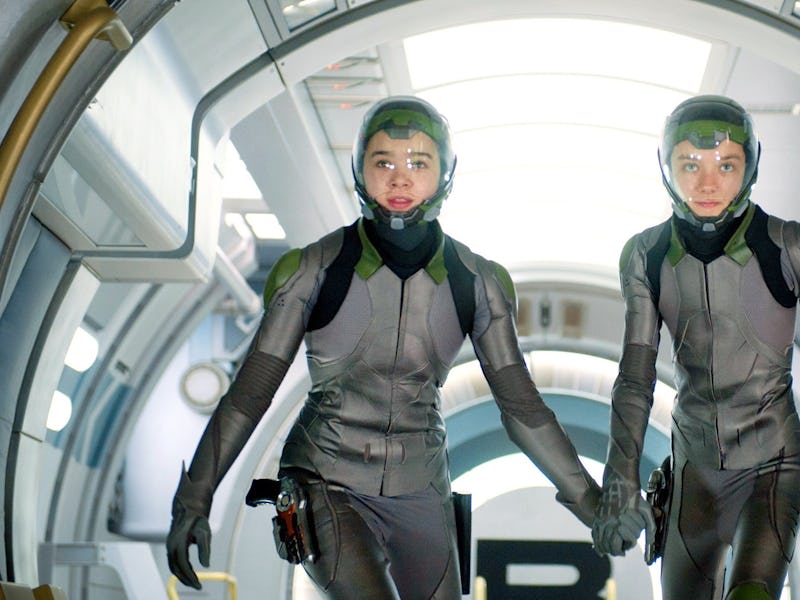Ender’s Game Deserved Better Than Its Reputation, Even if Orson Scott Card Didn’t
The movie does its best to show the empathy that Card wouldn’t extend to his fans.

If you’ve glanced in the general direction of the internet recently, you’re likely aware of the hubbub over Hogwarts Legacy. It’s become increasingly difficult to untangle the blockbuster video game and the Harry Potter franchise it bulwarks from J.K. Rowling’s onerous views on trans rights, and while that hasn’t stopped Barnes & Noble stores from being 50% Wizarding World merchandise, it’s also ensured that we’re awash in thinkpieces on whether it’s ethical to consume a product that will trickle profits back to a creator intent on spewing hate and fear.
A decade ago, a similar drama played out in miniature. If you are or were a dorky teenager, odds are good you read Ender’s Game. Maybe it was on display in the library, maybe a friend recommended it, or maybe it simply materialized in your hands. Orson Scott Card’s 1985 novel is a rite of passage for budding sci-fi readers, its story of children chosen to train as military strategists to win humanity’s desperate war against the insectoid Formic perfect for those who saw themselves as the smartest kid in the classroom. Maybe you didn’t want to attend young Ender’s draconian Battle School but, like The Hunger Games after it, you immediately grasped its engrossing stakes.
Ender’s Game won the Nebula and Hugo, and its rapid-fire blend of worldbuilding, character development, and tactical wargames had long been pegged for Hollywood development. The story of its creation is its own essay, but by the time the movie was released in 2013, Card had written a pile of sequels and achieved significant success. He had also become a virulent homophobe.
Unlike Warts-gate, the Ender’s Game debate didn’t leak into the broader culture. Maybe its source material was too niche, or maybe we were just busy arguing about something else. But a boycott was organized, Lionsgate distanced themselves from Card, and Card put out a snippy, “Isn’t intolerance of intolerance the real intolerance?” statement.
The boycotters won; Ender’s Game was a financial failure, although mixed reviews and mainstream indifference likely played a larger role than anger at Card, no matter how justified that anger was. It’s therefore easy to simply dismiss the whole affair as, “Well, good, the product sucked anyway.” As Rowling’s more unhelpfully reductive critics argue, Harry Potter is simply a childish fantasy for the easily mollycoddled, so why would anyone even want to play Legacy?
But the childish fantasy made a gazillion dollars, so there was clearly some appeal, one that needs to be understood to explain why fans can be so hurt by a creator. The irony is that Ender’s Game explored the loneliness of childhood and the isolation that precociousness can create with an empathy that Card steadfastly refused to extend to his LGBT fans.
Confusingly, the movie glosses over why child generals are necessary, so you’ll just have to roll with it.
That empathy also struggles to emerge in the film, which zeroes in on the wargames that young Andrew “Ender” Wiggin (Asa Butterfield) and his military school chums are thrown into. There are attempts to engage with the push and pull between Ender learning to make friends and Colonel Hyrum Graff’s (Harrison Ford, who deigns to bother acting in his more important scenes) need to keep him isolated so he can make difficult decisions, but there’s a lot of story to cram in here, and the characters are thinly sketched.
Ender’s Game makes a rough first impression, with a rushed intro and clunky exposition that doesn’t trust you to piece the world together. But once Ender enters the battle room — essentially a zero-gravity laser tag arena — the movie picks up. It’s a unique environment, one of the few sci-fi battlefields to acknowledge that space battles take place in space, and it’s rewarding to watch Ender triumph over increasingly difficult odds, even if it feels like the supposed boy Clausewitz keeps winning because his opponents snoozed through their tactical seminars.
Ender’s misfit friends devolve into set decoration in the film’s back half, but it’s there where Ender’s Game shines regardless. Ender is promoted to command school, where he’s relentlessly drilled on grand strategy amid the ruins of a conquered Formic colony. The already snazzy visuals reach a new level as reams of drones disgorge from their carriers to engage countless alien drones and, while the alien planet isn’t ground-breaking, its sudden and strange appearance after all the sterile human spaces is a reminder of how little we know about the enemy. It helps that Ben Kingsley’s Māori war hero, Mazer Rackham, makes for Ender’s most intriguing companion despite limited screentime.
Ender and Rackham work together to defeat the Formic, which the movie never calls “buggers” like the book perpetually does.
Ender’s battles grow harder until his graduation exam presents him with an absurdly unfair challenge. Even if you don’t know that a big twist is coming, the tenor of the scene is enough to make you sit up and pay attention. There’s a lot in Ender’s Game that doesn’t work, and yet, in this moment, it all kind of comes together anyway. The conclusion is no less powerful for the fact that there were a few stumbles in getting to it, and the movie as a whole deserves better than its reputation, even if Card doesn’t.
In the finale, Ender is horrified to learn that the decisions he’d made in what he thought was a hypothetical vacuum had affected real lives. He sought to understand his enemy, and came to realize they only ever wanted to live in peace. That’s a good lesson for Rowling and Card, if only they would reach out and grasp it.
Ender’s Game is streaming on HBO Max until March 31.
This article was originally published on